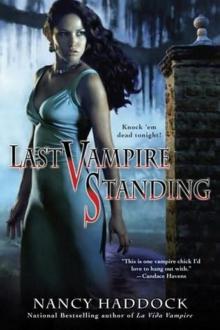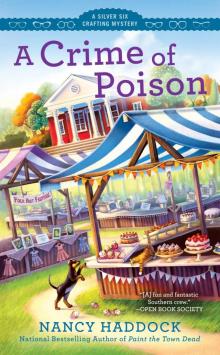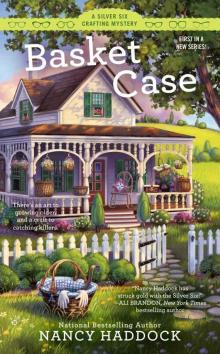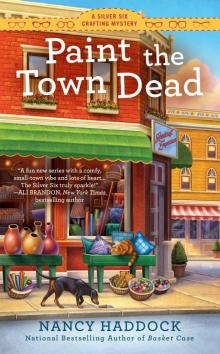- Home
- Nancy Haddock
A Crime of Poison Page 2
A Crime of Poison Read online
Page 2
My phone vibrated in the pocket of my pants. The screen showed it was Aunt Sherry calling.
“Are you standing outside for a reason, or just basking in the glow?”
“Basking,” I said on a chuckle.
“Well, get it in gear. I need you to pack Diane Grindall’s jewelry and deliver it to her. She has help putting up her tent, but she broke her leg last week, and the less she has to hobble on those crutches, the better.”
“Be right there.”
Inside, the store felt more like Party Central than a shopping destination. Smiling faces, excited greetings, and laughter echoed through the space. I’d barely placed the clipboard on the antique counter when Sherry snagged my elbow and towed me through the crowd to reintroduce me to everyone. I’d met some of the artists at Sherry’s Spring Folk Art Festival in April, and others when they’d dropped off their goods at the store over these past months. The rest I knew only from phone calls and e-mails. Bless them, most had been at least agreeable if not enthusiastic about giving the new venue and the Saturday-Sunday time frame a shot.
We’d insisted that our vendors pick up any of their wares consigned in the store for the duration of the festival. We didn’t want to be in competition with booth sales, which was partly why the store was packed and the party was on. Our established artists had come to gather their items and stayed to visit, while our new vendors came to make connections.
Social obligation met, Sherry pulled me back toward the antique glass counter. We displayed extra delicate or expensive items on the three tiers of glass shelves.
“Diane’s jewelry is on the bottom tier,” she said. “There’s a small box on the shelf behind the counter. Pack her things and run them over to her, will you, child?”
“I keep the earring and necklace sets together, right?”
“I’m sure that would be helpful.”
Someone called Sherry from across the room, so she patted my arm and took off. I moved behind the counter and began packing the exquisite jewelry made with pearls and semiprecious gems while I watched the Silver Six work the room.
A few steps from me, Maise, the chief cook of the Six, talked recipes with BBQ Bo, a handsome black man who sold amazing meat rubs for grilling. A few steps away, Eleanor laughed with a stained-glass vendor, and, after assembling boxes all morning, she looked as elegant as ever.
Across the room, Aster seemed to be consulting with a vendor I didn’t know. The younger woman pointed to a jar of Aster’s balm, and Aster gestured at others. A master gardener, Aster used essential oils to create her line of lotions and potions. Shortly before our website went live, she changed her product name to Aster’s Garden. The last of her redesigned labels hadn’t arrived until after five yesterday afternoon, and then it was all hands on deck to carefully align the self-adhering stickers on every salve, balm, body butter, hand lotion, and room spritzer in her inventory.
As I watched, sure enough Aster sprayed a bit of what was likely lavender water over her companion’s head, and the younger woman beamed. Since Aster kept small bowls of the lavender flowers around the shop, the scent subtly permeated the place. She declared that it was why shoppers lingered instead of dashing in and out, and since none of our patrons had been allergic to lavender so far, who was I to argue? Especially when she patiently taught me about herbs and plants so I could more knowledgeably answer customer questions when I was working the store alone.
Not far from Aster, Fred stood at a shelf that held metal art, carefully picking up this piece then that one to show the dollhouse maker. After I’d made an offhand suggestion to them a few months ago, Fred and Dab had teamed up to begin crafting metal art from Fred’s surplus of nuts, bolts, washers, nails, and anything else they scrounged. Most pieces were small enough to display on shelves, but some were large enough to put on the sidewalk outside the store.
A burst of laughter near the bay window caught my attention, and I spotted Dab chatting with mosaics artist Mags Deets. To my surprise, he looked a little smitten, and so did she. I didn’t hear every word he said but gathered our widowed, retired chemical engineer was telling Mags a story about distilling Aster’s homegrown herbs in two honest-to-moonshine stills. They had originally been in the basement but were now snug in two small garages behind the farmhouse—electric-hot-plate-operated, of course.
As I finished packing Diane’s jewelry, Sherry continued her rounds, speaking with everyone, just like the natural hostess she was. Her graying brown hair was cut in a wedge style, and this afternoon a sweep of long bangs covered her left eye. With the macular degeneration in that eye, covering it with her hair allowed her to focus better with her right eye when needed. How she managed to continue weaving baskets in a plethora of sizes and designs—and even crochet hemp and cotton twine baskets—amazed me. She’d begun working with gourds more and more, too. She preferred painting them rather than etching or wood burning, and wove the coils from pine needles, raffia, and vines to finish the top of her gourds.
I gazed at each of the Silver Six again, and smiled. Being with the seniors gave me a warm glow. Yes, even when they occasionally drove me a little crazy.
The wind chimes over the door tinkled, admitting another vendor coming to pick up her needlepointed pieces. Dang, it was after three. I needed to move out.
I tucked the last earring card into the box, waved at Sherry, and went to deliver Diane’s jewelry.
Chapter Two
Delivering the jewelry was no hardship. I loved the ambiance of our historic town square anchored by the limestone courthouse set on a slight rise. Traffic split to flow around the courts building on Magnolia Road, our north-south two-lane highway. The street was aptly named because magnificent magnolia trees graced the courthouse grounds, lilies crowded the flower beds in every season, and a cozy white wooden gazebo nestled beside the building. Today traffic still eased by on Magnolia, but tomorrow the road would be blocked off.
Surrounding the courthouse on all four sides were brick and limestone buildings, including our store. Built with shared walls that formed the bulk of our town square, every structure dated from the late 1800s to the 1960s and housed family-owned businesses, some that had been passed down through generations. Each business boasted high-tech features, yet each treated their customers the old-fashioned way. Lee Street bordered the square on the north side, and Stanton Drive, named for my ancestor and Lilyvale’s founder, bordered the south end.
I crossed Magnolia to do a quick reconnaissance mission, as Maise would say, and see if vendors needed anything. Although we’d have city police and county deputies patrolling the square all night, and in the daytime, too, most artisans planned to put their wares out in the morning. Today was geared for tent setups and preparing the spaces for displaying their art pieces on tables and shelves.
Everything was in order until I arrived at Diane’s assigned spot to put the box of jewelry directly into her hands. Her space was catty-corner from the emporium and in front of Wallis Computer Sales & Repair, right where it should be. Her daughter, Darlene, and her teenaged grandson, Beau, had done a fine job of setting up the tent and her display tables.
Trouble was, Diane’s tent was being crowded by Dexter Hamlin’s Gone to the Dogs food cart. Two months ago when I’d first met him, I’d instantly detested Dex, a fleshy man in his forties with greasy hair and a permanent sneer. Although we had okayed a multichurch bake sale to run on Saturday, Hamlin was the sole licensed food vendor admitted to the festival. He’d pulled political strings to get approved even though no one seemed to have the least liking for him. It made me wonder what hold he had over his connections.
I made my face as blank as I could manage as I approached him.
“Mr. Hamlin, you’ve set up your stand way off your mark,” I said reasonably. “You’ll need to move to the left.”
“Hell I will. That puts me too far from the action and too close to the cross street
.”
“You have more visibility closer to Lee Street, especially if you angle the front of your stand in that direction,” I pointed out patiently.
“Ain’t happenin’ and here’s another thing. I’m selling energy drinks whether you like it or not.”
“I don’t like it,” I said through gritted teeth, “and neither will the pharmacy or other stores that have stocked extra energy drinks. You agreed to sell only water. You need to honor your word.”
Dex’s answer was to spit in the parking lot and yell at a slightly older man with hunched shoulders to move a case of corn dogs. The guy wore dingy white from his floppy gardener’s hat to his untucked shirt and baggy pants, all the way to his tennis shoes.
If I’d been the violent type and Dex had been less of a bully, I might’ve smacked him and been done with it. Instead I held my temper with both hands and an act of God and held my ground.
“You will move, Mr. Hamlin, and you’ll do it now. In fact, you’ll set up a full fifteen feet away from the nearest tent.”
He let loose with a string of obscenities insulting my ancestors, among other things. “You think you can force me to move? Try it.”
Since I knew the rules about spacing between artists’ tents and exactly what Dex had been permitted to sell, I pulled out my smart phone to punch some numbers.
“Who the hell you calling?” he barked as he loomed over me. Not a tall order since I’m only five-three.
“I’m calling reinforcements, Mr. Hamlin. I don’t have the time to argue or the patience to put up with your attitude.”
Thankfully, the call was answered before Hamlin could mount a retort. On a Friday afternoon, this near closing time, it was a miracle to reach anyone at the county offices.
“Hi, Ali. Is County Health Inspector Clancy Edwards still there? I need him in the square pronto. It’s about the food vendor we let into the folk art festival.”
I paused, listened, and watched as Dex’s complexion turned a mottled purple. It would solve my problem if he stroked out on the spot, but no such luck. Mean of me, but it was how I felt.
“Okay, you can tell Mr. Edwards that I’d just as soon shut down Mr. Hamlin’s operation altogether, but I’ll settle for him doing what I say to do. And he needs to watch his mouth, too.”
Now I smiled, nodded. “I’ll be right here waiting, Ali, and thanks.”
• • •
Clancy Edwards was in his forties, average in height, weight, and looks in general, but his black curly hair and intense gray eyes made him memorable. I explained my issues to him, then stepped away as he talked with Dex Hamlin. After Edwards pointed at the ground and Lee Street repeatedly, and Hamlin replied with wild gestures including an abbreviated sign language obscenity, creepy Dex called to his helper and they moved the cart. Edwards stayed until I gave him the thumbs-up that the cart was in a position I could live with, and I overheard the inspector warn Dex not to move the cart again or to sell energy drinks.
In spite of the positive outcome, I held enough residual anger to spit a whole box of Fred’s nails. I was also a little spooked by the black glare Hamlin gave me before I walked away. Talk about killing looks.
I absolutely could not go back to the emporium in this state. Sherry would know in a heartbeat that I was upset. Nope, I needed to vent, and I knew just the person to see.
I pushed through the Great Buns Bakery door and sent the customer bell to jangling. The air-conditioning cooled me physically, and a deep breath instantly gave me a sugar high. An old-fashioned lunch counter lined with tall bistro chairs and a small grill behind it took up one wall of the bakery. To the right stretched a glorious glass display case of tray upon tray of delightful deliciousness.
I spotted Great Buns co-owner and my friend Judy Armistead immediately. “I need a chocolate croissant and Fred’s Colt .45.”
She calmly nodded. “Don’t we all.”
Judy, a five-foot fireball, turned from the grill behind the stainless-steel countertop. Her green eyes always seemed merry, and her short medium-platinum blonde hair made her look fey. “Exactly who are you gunning for?”
“Dexter Hamlin.”
“Gone to the Dogs Dex?”
“That’s him.”
“Some people just need shootin’, don’t they?” She used the spatula in her hand to point at “our” bistro table. The one closest to the phone so she could reach it quickly. “Sit before your fidgeting wears me thin.”
I wasn’t aware I fidgeted, but I did catch myself checking the time on my phone and realized it was a minute later than the last time I’d looked. Geez. On the upside, I had fifteen minutes to spare before I needed to head back to the store to meet Jasmine and our potential new employee.
I skirted the tall and normal-height bistro tables and chairs arranged in the dining space, and sat as instructed. Meantime, Judy snagged the largest chocolate croissant in the tray and warmed it in the microwave. In no time flat, she set two latte cups that looked more like bowls on the table. Then she placed the warm croissant on a white plate, plucked utensils and a napkin from their round holders, and headed around the counter. How she kept her white Great Buns apron over white twill pants and a white T-shirt from being spotted with everything from grill grease to chocolate icing, I’d never know. Her husband, Grant, never seemed to have a speck or spot marring his clothes either, and he was the chief baker.
I used a fork on the croissant instead of ripping into it with my bare hands because, hey, I was raised right. But when I found myself savagely chomping instead of sanely chewing, I forced myself to relax. I savored, and swallowed, and repeated until only flakes remained on my plate. I thought about eating those with my finger, but I did have standards. I only did that in the privacy of my apartment.
“Better?” Judy asked when I pushed the plate away.
“Great Buns always makes it better.”
Judy quirked an eyebrow.
“That came out weird, but you know what I mean.”
“Yes, and Grant and I thank you for praising our humble bakery. So what did Dex do to get you so riled?”
“Besides being a total pig, Horrible Hamlin gave me grief about his assigned spot, and told me he was selling energy drinks whether I liked it or not. He’s a slimy jerk, and talk about obscenities! I’m no prude, but the man must curse every third word. He takes low language to new heights.”
Judy patted my clenched hand. “Breathe, girl. Dex is supposed to be selling corn dogs and hot dogs, right?”
“And bottled water, but not a single thing more or heads will roll.”
“How many artists are set up near him?” Judy asked.
“Only one, and I made him move another five feet away from the original spot I’d mapped for him. The man snaps at everyone, and yells at that middle-aged guy he hired to help him. I called Clancy Edwards and—”
“The county health inspector?”
“The very same. He came right over and laid down the law with Dex. Promised to close him down if he didn’t comply with the health laws and my wishes and stick to selling only what he was approved to sell.”
“What happens if he keeps making trouble?”
I grinned. “That’s where Fred’s Colt .45 comes in.”
Judy chuckled. “Well, Dex aside, I still think it was very civic-minded to hold the festival here in town. I mean, no one on the square really suffered when it was out at your Aunt Sherry’s, but if today’s sales are any indication of the weekend draw, we’ll make rent for a year.”
“That’s fantastic! I hope everyone does as well.”
“You know it. Oh, are you taking a maple donut back for Fred?”
I laughed. “I have to sneak it in the back so Maise doesn’t see it.”
“I’ll bag it for you,” she said, and rose, sweeping up my plate and her cup.
I finished my
coffee, took the empty cup to the counter, and pulled a ten-dollar bill from my back pocket.
A minute later, I waved good-bye, told Judy to give Grant my best, and eased out the door, hoping no one would waylay me. Luck was with me, and I quickly hoofed it around the corner, then turned into the alley that ran behind all the stores.
A city office building sat on the corner behind Judy’s bakery, but a parking lot took the rest of the space across the alley. The Handcraft Emporium, the last building at the end of the block, had started life as the Stanton General Store, established by my ancestors who founded Lilyvale. The name changed to Sissy’s Five & Dime when my great-something Aunt Sissy had taken over the store. She and her husband had lived upstairs in the apartment I now called home. My Aunt Sherry had eventually inherited the building and had rented it to a variety of businesses over the years.
When I’d come to town last April to find out why booms repeatedly shook my aunt’s ancestral farmhouse and smoke billowed out the kitchen windows, I’d learned that my Aunt Sherry had macular degeneration. Her condition had nothing to do with the incidents, and the disease hadn’t worsened or slowed her down one iota. But Sherry Mae had been my mother’s sister, and we were the last of the Stantons. Leaving my job at the prestigious Gates Fine Art Gallery in Houston and moving to Lilyvale was the right decision.
The question of what to do with myself in the small town was solved when I proposed opening the Handcraft Emporium not only to sell the Silver Six’s folk art but also take other arts and crafts on consignment. With my background in fine art and marketing, and an eye for design and arrangement, I became store manager. Since the Six were already connected to the folk art world, the idea quickly caught on. Now the store provided Sherry, Aster, Eleanor, Fred, Dab, and all their folk art friends a venue to sell art and crafts all year-round. At last count, we handled the work of forty-two artists, and the arrangement had succeeded beyond my dreams to benefit both the craftspeople and the store.

 Last Vampire Standing
Last Vampire Standing A Crime of Poison
A Crime of Poison La Vida Vampire
La Vida Vampire Silver Six Crafting Mystery 01 - Basket Case
Silver Six Crafting Mystery 01 - Basket Case Paint the Town Dead
Paint the Town Dead Always the Vampire
Always the Vampire